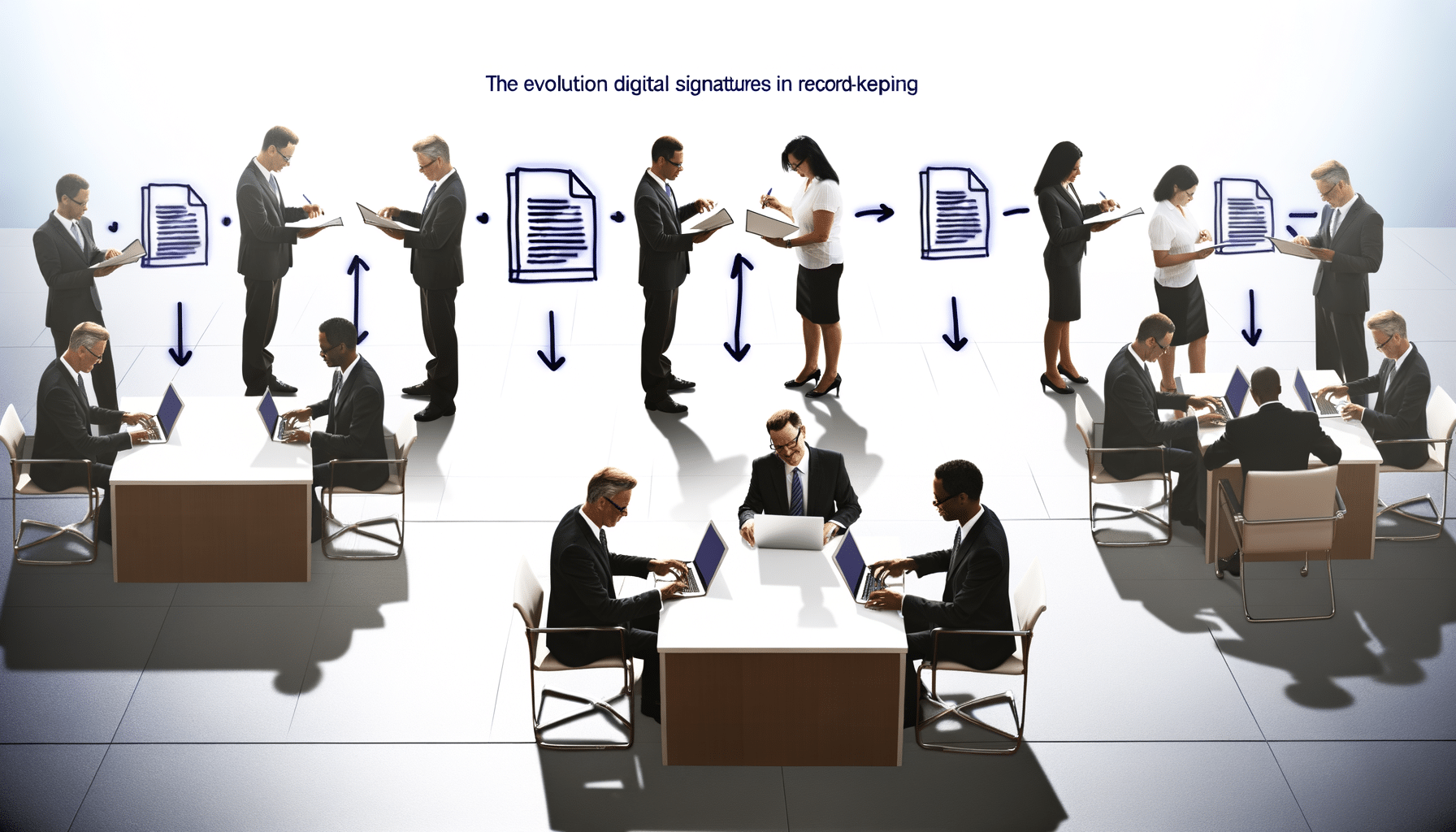- Security Trends
- September 30, 2023
The Evolution of Digital Signatures in Record-Keeping

In an ever-evolving digital landscape, the way we sign documents has transcended from traditional paper and ink to digital signals. Digital signatures, a subset of electronic signatures, have revolutionized record-keeping by offering enhanced security and authenticity while ensuring compliance with various regulations. As someone who has been deeply involved in technology and record management, I find this evolution not just fascinating but essential for businesses looking to modernize operations.
The Dawn of Digital Signatures
When I first encountered digital signatures, I was acutely aware of the myriad challenges businesses faced with manual signatures. The process was cumbersome, time-consuming, and fraught with opportunities for fraud. Digital signatures emerged as a solution heralded for their ability to authenticate the signer’s identity and protect the integrity of the document. Utilizing cryptographic algorithms, digital signatures ensure that documents remain unaltered, providing invaluable evidentiary support.
How Digital Signatures Elevate Record-Keeping
Today, digital signatures have become indispensable in record-keeping, especially as we encounter rigorous compliance requirements such as GDPR and HIPAA. Implementing digital signatures in record-keeping systems means improved security features, streamlined processes, and unparalleled efficiency. Here are several ways digital signatures have transformed record management:
- Authentication & Security: Digital signatures provide a robust security layer, ensuring that only authorized individuals sign documents. This authentication prevents unauthorized access and modifications, which can drastically reduce cases of identity theft and document breaches.
- Workflow Efficiency: Digital signatures expedite document workflows. What once took days or weeks now takes mere minutes. By eliminating the need for physical presence or mail, businesses save precious time and resources.
- Cost Reduction: With digital signatures, the expenses associated with paper-based processes—printing, scanning, physical storage, and mailing—are significantly reduced. This cost-efficiency is often welcomed by finance departments aiming to optimize budgets.
- Legal Compliance: Digital signatures help businesses comply with various regulatory frameworks. They maintain an immutable proof of consent and document integrity, making them legally binding across numerous jurisdictions.
The Evolution of Technologies Behind Digital Signatures
One of the most intriguing aspects of digital signatures is how they continue to evolve technologically. From initial cryptographic techniques to cutting-edge blockchain integration, technologies driving digital signatures are becoming increasingly sophisticated. At RecordsKeeper.AI, I have had the opportunity to witness firsthand how blockchain ensures the privacy and immutability of signed documents, offering a comprehensive audit trail that is transparent and secure.
Real-World Applications: Bridging the Gap
Numerous sectors have embraced digital signatures, bridging the gap between digital and paper-based operations:
- Legal Industry: Lawyers use digital signatures for fast, secure document exchanges, reducing the need for cumbersome paper trails.
- Healthcare: Hospitals employ digital signatures for patient records and consent forms, ensuring compliance with health regulations and improving patient data security.
- Financial Institutions: Banks and financial firms utilize digital signatures within their digital record management systems to facilitate faster transactions and reduce fraud risks.
Navigating the Future of Digital Signatures
As we look toward the future, digital signatures will likely become even more integral in record-keeping processes. With increasing global digitalization, more businesses are recognizing the strategic advantages of deploying digital signature technology to enhance security and operational efficiency. It stands to reason that AI and machine learning will further automate these processes, bringing about faster and more accurate validation techniques.
Conclusion
The evolution of digital signatures in record-keeping is a testament to the progressive nature of security technology. As the founder of RecordsKeeper.AI, I’ve seen the power of digital signatures in providing businesses a seamless, secure, and compliant way to manage records. I encourage all organizations—whether you’re a burgeoning startup or a well-established enterprise—to explore the transformative power of these technologies. For further insights and updates on how digital signatures can revolutionize your record-keeping processes, continue to follow my journey and explore the resources we provide. Let’s modernize the way we handle records together for a more secure and efficient tomorrow.
Toshendra Sharma is the visionary founder and CEO of RecordsKeeper.AI, spearheading the fusion of AI and blockchain to redefine enterprise record management. With a groundbreaking approach to solving complex business challenges, Toshendra combines deep expertise in blockchain and artificial intelligence with an acute understanding of enterprise compliance and security needs.
Archives
- January 2025
- December 2024
- November 2024
- October 2024
- September 2024
- August 2024
- July 2024
- June 2024
- May 2024
- April 2024
- March 2024
- February 2024
- January 2024
- December 2023
- November 2023
- October 2023
- September 2023
- August 2023
- July 2023
- June 2023
- May 2023
- April 2023
- March 2023
- February 2023
- January 2023
- December 2022
- November 2022
- October 2022
- September 2022
Want to get more content like this?
Signup to directly get this type of content to your inbox!!
Latest Post
Document Control for Equipment Maintenance
- January 20, 2025
Managing Records for Multiple Clients
- January 19, 2025
Handling Conference Documentation
- January 18, 2025
Setting Up Department Record Reviews
- January 17, 2025





